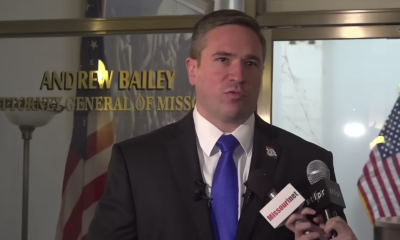National
9th Circuit: Gender reassignment surgery must be granted to trans inmates
Court rules denying procedure violates 8th Amendment


Denying gender reassignment surgery to transgender prison inmates is prohibited under the U.S. Constitution, a federal appeals court ruled Friday.
A three-judge panel on the U.S. Ninth Circuit Court of Appeals issued the per curiam decision on the basis that gender reassignment surgery is medically necessary, so denying the procedure to prison inmates violates the Eighth Amendment.
“We hold that where, as here, the record shows that the medically necessary treatment for a prisoner’s gender dysphoria is gender confirmation surgery, and responsible prison officials deny such treatment with full awareness of the prisoner’s suffering, those officials violate the Eighth Amendment’s prohibition on cruel and unusual punishment,” the decision says.
The three-judge panel that issued the ruling consists of U.S. Circuit Judge Mary Margaret McKeown, a Clinton appointee; U.S. Circuit Judge Ronald Gould, another Clinton appointee; and U.S. District Judge Robert Lasnik, another Clinton appointee sitting by designation on the Ninth Circuit.
The ruling affirms taxpayer funds will be used to provide gender reassignment surgery to Adree Edmo, who’s transgender and has been an inmate in the Idaho State Correctional Institution since 2012. Edmo has been ever since she pleaded guilty to sexual abuse of a 15-year-old male at a house party.
Edmo doesn’t have access to her personal funds while she’s incarcerated. The estimated cost of male-to-female gender reassignment surgery can be more than $100,000.
Medical providers have documented Edmo’s feminine presentation since 2012 and she has testified she “continues to actively think about self-castration” in prison, according to the Ninth Circuit decision.
“I am relieved and grateful the court recognized my right to necessary medical treatment, and that I will get the surgery I need,” Edmo said in a statement. “I hope my case helps the State of Idaho understand that they can’t deny medical care to transgender people.”
The case came to the Ninth Circuit upon appeal after U.S. Chief District Judge B. Lynn Winmil in Idaho issued a decision ordering the state to grant gender reassignment surgery to Edmo, who sued the state in 2017 after the Idaho Department of Corrections refused to great her the procedure.
“Although we addressed this appeal on an expedited basis, it has been more than a year since doctors concluded that GCS is medically necessary for Edmo,” the Ninth Circuit decision says. “We urge the state to move forward. We emphatically do not speak to other cases, but the facts of this case call for expeditious effectuation of the injunction.”
The Ninth Circuit affirmed Winmill’s order with respect to granting gender reassignment surgery to Edmo, but remanded to the trial court a separate with respect to whether Corizon, Inc., a private for-profit corporation that provides health care to inmates in Idaho prisons, should be included in the injunction.
The Ninth Circuit is now the only federal appeals court with a standing ruling ordering gender reassignment surgery. Although a three-judge panel on the U.S. First Circuit Court of Appeals ordered the procedure in 2014, the full court later reversed that decision.
Representing Edmo in the case was the National Center for Lesbian Rights, which noted the significance of the decision after it was handed down.
“One of the foundational principles of our Constitution is that the State cannot subject people in its custody to cruel and unusual punishment, including by failing to treat serious medical conditions,” NCLR Senior Staff Attorney Amy Whelan said in a statement. “This ruling is in line not only with long-standing medical evidence, but also with legal rulings across the country that it is dangerous and unconstitutional to deny transgender people access to medically necessary care in prison.”
The Washington Blade has placed a request in with the Boise-based law firm Moore Elia Kraft & Hall, LLP, which is representing the Idaho Department of Corrections, to seek comment on whether the state will seek an “en banc” rehearing before the Ninth Circuit or take up the matter before the U.S. Supreme Court.
The issue of whether transgender inmates are entitled to gender reassignment surgery has been percolating for some time and has dogged Democratic presidential candidate Kamala Harris, who as attorney general represented the California Department of Corrections in seeking to deny the procedure to two inmates.
As media scrutiny of the cases grew, Harris helped the California Department of Corrections reach an agreement in which to set up a process where transgender inmates could obtain transition-related care, including gender reassignment surgery. Both of the transgender inmates in those cases were able to obtain gender reassignment surgery, one through the state health care system after obtaining parole.
It should be noted Harris didn’t seek to the agreement to grant transgender inmates gender reassignment surgery until after a court already ordered one the transgender inmates be granted the procedure. At least one transgender advocate in California has also said the California Department of Correction has built a reputation for not fulfilling the agreement reached on behalf of transgender inmates.
Harris, in a statement provided to the Washington Blade from her presidential campaign, said she supports the Ninth Circuit decision in the Edmo case.
“This ruling rightly reaffirms the right to adequate and comprehensive health care, including transition-related care for those at correctional facilities,” Harris said. “Everyone deserves access to compassionate and comprehensive care.”
Federal Government
Lambda Legal praises Biden-Harris administration’s finalized Title IX regulations
New rules to take effect Aug. 1

The Biden-Harris administration’s revised Title IX policy “protects LGBTQ+ students from discrimination and other abuse,” Lambda Legal said in a statement praising the U.S. Department of Education’s issuance of the final rule on Friday.
Slated to take effect on Aug. 1, the new regulations constitute an expansion of the 1972 Title IX civil rights law, which prohibits sex-based discrimination in education programs that receive federal funding.
Pursuant to the U.S. Supreme Court’s ruling in the landmark 2020 Bostock v. Clayton County case, the department’s revised policy clarifies that discrimination on the basis of sexual orientation and gender identity constitutes sex-based discrimination as defined under the law.
“These regulations make it crystal clear that everyone can access schools that are safe, welcoming and that respect their rights,” Education Secretary Miguel Cardona said during a call with reporters on Thursday.
While the new rule does not provide guidance on whether schools must allow transgender students to play on sports teams corresponding with their gender identity to comply with Title IX, the question is addressed in a separate rule proposed by the agency in April.
The administration’s new policy also reverses some Trump-era Title IX rules governing how schools must respond to reports of sexual harassment and sexual assault, which were widely seen as imbalanced in favor of the accused.
Jennifer Klein, the director of the White House Gender Policy Council, said during Thursday’s call that the department sought to strike a balance with respect to these issues, “reaffirming our longstanding commitment to fundamental fairness.”
“We applaud the Biden administration’s action to rescind the legally unsound, cruel, and dangerous sexual harassment and assault rule of the previous administration,” Lambda Legal Nonbinary and Transgender Rights Project Director Sasha Buchert said in the group’s statement on Friday.
“Today’s rule instead appropriately underscores that Title IX’s civil rights protections clearly cover LGBTQ+ students, as well as survivors and pregnant and parenting students across race and gender identity,” she said. “Schools must be places where students can learn and thrive free of harassment, discrimination, and other abuse.”
Michigan
Mich. Democrats spar over LGBTQ-inclusive hate crimes law
Lawmakers disagree on just what kind of statute to pass

Michigan could soon become the latest state to pass an LGBTQ-inclusive hate crime law, but the state’s Democratic lawmakers disagree on just what kind of law they should pass.
Currently, Michigan’s Ethnic Intimidation Act only offers limited protections to victims of crime motivated by their “race, color, religion, gender, or national origin.” Bills proposed by Democratic lawmakers expand the list to include “actual or perceived race, color, religion, gender, sexual orientation, gender identity or expression, ethnicity, physical or mental disability, age, national origin, or association or affiliation with any such individuals.”
Democratic Gov. Gretchen Whitmer and Attorney General Dana Nessel have both advocated for a hate crime law, but house and senate Democrats have each passed different hate crimes packages, and Nessel has blasted both as being too weak.
Under the house proposal that passed last year (House Bill 4474), a first offense would be punishable with a $2,000 fine, up to two years in prison, or both. Penalties double for a second offense, and if a gun or other dangerous weapons is involved, the maximum penalty is six years in prison and a fine of $7,500.
But that proposal stalled when it reached the senate, after far-right news outlets and Fox News reported misinformation that the bill only protected LGBTQ people and would make misgendering a trans person a crime. State Rep. Noah Arbit, the bill’s sponsor, was also made the subject of a recall effort, which ultimately failed.
Arbit submitted a new version of the bill (House Bill 5288) that added sections clarifying that misgendering a person, “intentionally or unintentionally” is not a hate crime, although the latest version (House Bill 5400) of the bill omits this language.
That bill has since stalled in a house committee, in part because the Democrats lost their house majority last November, when two Democratic representatives resigned after being elected mayors. The Democrats regained their house majority last night by winning two special elections.
Meanwhile, the senate passed a different package of hate crime bills sponsored by state Sen. Sylvia Santana (Senate Bill 600) in March that includes much lighter sentences, as well as a clause ensuring that misgendering a person is not a hate crime.
Under the senate bill, if the first offense is only a threat, it would be a misdemeanor punishable by one year in prison and up to $1,000 fine. A subsequent offense or first violent hate crime, including stalking, would be a felony that attracts double the punishment.
Multiple calls and emails from the Washington Blade to both Arbit and Santana requesting comment on the bills for this story went unanswered.
The attorney general’s office sent a statement to the Blade supporting stronger hate crime legislation.
“As a career prosecutor, [Nessel] has seen firsthand how the state’s weak Ethnic Intimidation Act (not updated since the late 1980’s) does not allow for meaningful law enforcement and court intervention before threats become violent and deadly, nor does it consider significant bases for bias. It is our hope that the legislature will pass robust, much-needed updates to this statute,” the statement says.
But Nessel, who has herself been the victim of racially motivated threats, has also blasted all of the bills presented by Democrats as not going far enough.
“Two years is nothing … Why not just give them a parking ticket?” Nessel told Bridge Michigan.
Nessel blames a bizarre alliance far-right and far-left forces that have doomed tougher laws.
“You have this confluence of forces on the far right … this insistence that the First Amendment protects this language, or that the Second Amendment protects the ability to possess firearms under almost any and all circumstances,” Nessel said. “But then you also have the far left that argues basically no one should go to jail or prison for any offense ever.”
The legislature did manage to pass an “institutional desecration” law last year that penalizes hate-motivated vandalism to churches, schools, museums, and community centers, and is LGBTQ-inclusive.
According to data from the U.S. Department of Justice, reported hate crime incidents have been skyrocketing, with attacks motivated by sexual orientation surging by 70 percent from 2020 to 2022, the last year for which data is available.
Twenty-two states, D.C., Puerto Rico, and the U.S. Virgin Islands have passed LGBTQ-inclusive hate crime laws. Another 11 states have hate crime laws that include protections for “sexual orientation” but not “gender identity.”
Michigan Democrats have advanced several key LGBTQ rights priorities since they took unified control of the legislature in 2023. A long-stalled comprehensive anti-discrimination law was passed last year, as did a conversion therapy ban. Last month the legislature updated family law to make surrogacy easier for all couples, including same-sex couples.
A bill to ban the “gay panic” defense has passed the state house and was due for a Senate committee hearing on Wednesday.
Indiana
Drag queen announces run for mayor of Ind. city
Branden Blaettne seeking Fort Wayne’s top office

In a Facebook post Tuesday, a local drag personality announced he was running for the office of mayor once held by the late Fort Wayne Mayor Tom Henry, who died last month just a few months into his fifth term.
Henry was recently diagnosed with late-stage stomach cancer and experienced an emergency that landed him in hospice care. He died shortly after.
WPTA, a local television station, reported that Fort Wayne resident Branden Blaettne, whose drag name is Della Licious, confirmed he filed paperwork to be one of the candidates seeking to finish out the fifth term of the late mayor.
Blaettner, who is a community organizer, told WPTA he doesn’t want to “get Fort Wayne back on track,” but rather keep the momentum started by Henry going while giving a platform to the disenfranchised groups in the community. Blaettner said he doesn’t think his local fame as a drag queen will hold him back.
“It’s easy to have a platform when you wear platform heels,” Blaettner told WPTA. “The status quo has left a lot of people out in the cold — both figuratively and literally,” Blaettner added.

The Indiana Capital Chronicle reported that state Rep. Phil GiaQuinta, who has led the Indiana House Democratic caucus since 2018, has added his name to a growing list of Fort Wayne politicos who want to be the city’s next mayor. A caucus of precinct committee persons will choose the new mayor.
According to the Fort Wayne Journal Gazette, the deadline for residents to file candidacy was 10:30 a.m. on Wednesday. A town hall with the candidates is scheduled for 6 p.m. on Thursday at Franklin School Park. The caucus is set for 10:30 a.m. on April 20 at the Lincoln Financial Event Center at Parkview Field.
At least six candidates so far have announced they will run in the caucus. They include Branden Blaettne, GiaQuinta, City Councilwoman Michelle Chambers, City Councilwoman Sharon Tucker, former city- and county-council candidate Palermo Galindo, and 2023 Democratic primary mayoral candidate Jorge Fernandez.
-

 District of Columbia2 days ago
District of Columbia2 days agoReenactment of first gay rights picket at White House draws interest of tourists
-

 District of Columbia2 days ago
District of Columbia2 days agoNew D.C. LGBTQ+ bar Crush set to open April 19
-

 Arizona2 days ago
Arizona2 days agoAriz. governor vetoes anti-transgender, Ten Commandments bill
-

 Africa4 days ago
Africa4 days agoUgandan activists appeal ruling that upheld Anti-Homosexuality Act











